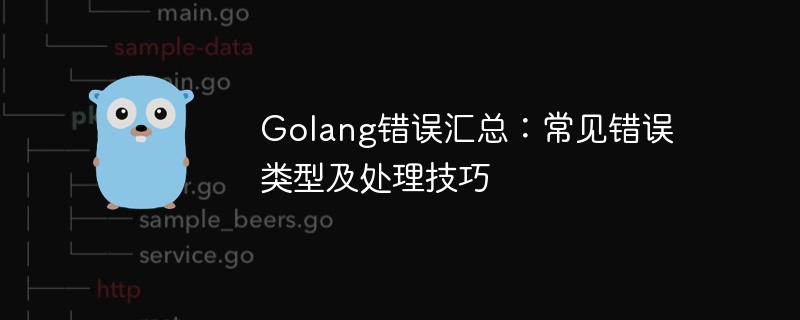

Golang error summary: common error types and handling techniques
As an excellent programming language, Go language has the characteristics of simplicity, efficiency, concurrency safety, etc., but in It is inevitable to encounter various errors in actual development. This article will introduce some common error types and handling techniques, and use specific code examples to help developers better understand and solve these problems.
Null pointer error is an error that occurs when dereferencing a null pointer, which may cause the program to crash. In order to avoid null pointer errors, we can perform null pointer judgment in the code.
var ptr *int
if ptr != nil {
// Handle the case where the pointer is not null
} else {
// Handle the case where the pointer is null
}Array out of range error refers to an error that occurs when we access an index that does not exist in the array. In order to avoid array out-of-bounds errors, we can determine whether the index is legal before accessing the array elements.
arr := []int{1, 2, 3}
index := 3
if index < len(arr) {
// Handle the situation where the index is legal
fmt.Println(arr[index])
} else {
// Handle index out-of-bounds situations
fmt.Println("Index out of bounds")
}Type assertion error refers to a type mismatch during type assertion. To avoid type assertion errors, we can perform type conversions in a safe way using type assertions.
var val interface{}
val = "hello"
str, ok := val.(string)
if ok {
// Handle cases where type conversion is correct
fmt.Println(str)
} else {
// Handle type conversion errors
fmt.Println("Type conversion error")
}When performing file operations, errors such as file non-existence and insufficient permissions may occur. In order to handle file operation errors, we need to perform error checking before opening files, writing files, etc.
file, err := os.Open("example.txt")
if err != nil {
// Handle file opening failure
fmt.Println("File opening failed:", err)
} else {
// Handle the situation when the file is opened successfully
defer file.Close()
}Goroutine leak refers to the situation where the created coroutine is not closed correctly, resulting in the failure of resources to be released. In order to avoid coroutine leakage, we can use sync.WaitGroup and other methods to wait for the coroutine to end.
var wg sync.WaitGroup
for i := 0; i < 3; i {
wg.Add(1)
go func() {
defer wg.Done()
//Coroutine processing logic
}()
}
wg.Wait()Summary: In Go language development, common error types include null pointer errors, array out-of-bounds errors, type assertion errors, file operation errors, and coroutine leaks. Through code examples and processing techniques, we can better avoid and solve these problems and improve the stability and reliability of the program. I hope this article helps you solve common error problems.
The above is the detailed content of Golang error summary: common error types and handling techniques. For more information, please follow other related articles on the PHP Chinese website!
 Usage of Type keyword in Go
Usage of Type keyword in Go
 How to implement linked list in go
How to implement linked list in go
 What are the Go language programming software?
What are the Go language programming software?
 How to learn go language from 0 basics
How to learn go language from 0 basics
 How to define variables in golang
How to define variables in golang
 What are the methods to implement operator overloading in Go language?
What are the methods to implement operator overloading in Go language?
 What are the operators in Go language?
What are the operators in Go language?
 What are the data conversion methods in golang?
What are the data conversion methods in golang?




